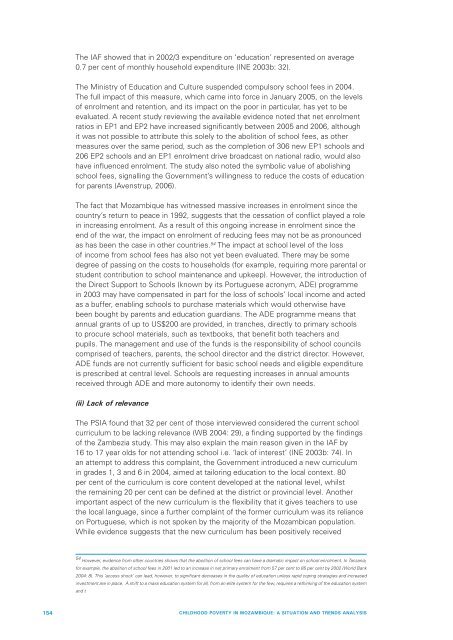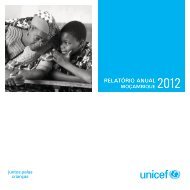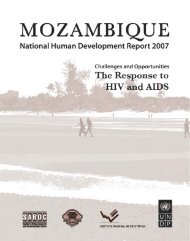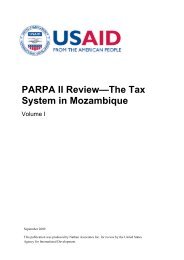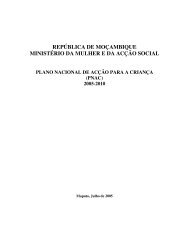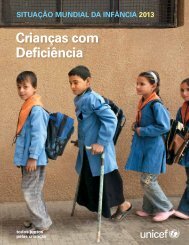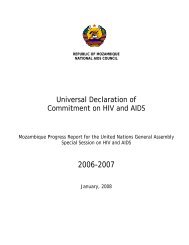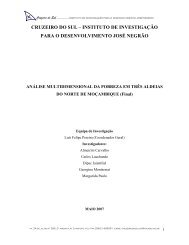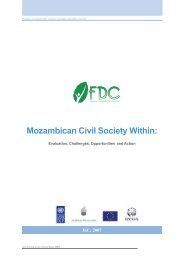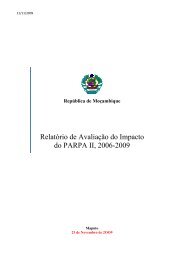Child Poverty in Mozambique. A Situation and Trend ... - Unicef
Child Poverty in Mozambique. A Situation and Trend ... - Unicef
Child Poverty in Mozambique. A Situation and Trend ... - Unicef
Create successful ePaper yourself
Turn your PDF publications into a flip-book with our unique Google optimized e-Paper software.
The IAF showed that <strong>in</strong> 2002/3 expenditure on ‘education’ represented on average<br />
0.7 per cent of monthly household expenditure (INE 2003b: 32).<br />
The M<strong>in</strong>istry of Education <strong>and</strong> Culture suspended compulsory school fees <strong>in</strong> 2004.<br />
The full impact of this measure, which came <strong>in</strong>to force <strong>in</strong> January 2005, on the levels<br />
of enrolment <strong>and</strong> retention, <strong>and</strong> its impact on the poor <strong>in</strong> particular, has yet to be<br />
evaluated. A recent study review<strong>in</strong>g the available evidence noted that net enrolment<br />
ratios <strong>in</strong> EP1 <strong>and</strong> EP2 have <strong>in</strong>creased significantly between 2005 <strong>and</strong> 2006, although<br />
it was not possible to attribute this solely to the abolition of school fees, as other<br />
measures over the same period, such as the completion of 306 new EP1 schools <strong>and</strong><br />
206 EP2 schools <strong>and</strong> an EP1 enrolment drive broadcast on national radio, would also<br />
have <strong>in</strong>fluenced enrolment. The study also noted the symbolic value of abolish<strong>in</strong>g<br />
school fees, signall<strong>in</strong>g the Government’s will<strong>in</strong>gness to reduce the costs of education<br />
for parents (Avenstrup, 2006).<br />
The fact that <strong>Mozambique</strong> has witnessed massive <strong>in</strong>creases <strong>in</strong> enrolment s<strong>in</strong>ce the<br />
country’s return to peace <strong>in</strong> 1992, suggests that the cessation of conflict played a role<br />
<strong>in</strong> <strong>in</strong>creas<strong>in</strong>g enrolment. As a result of this ongo<strong>in</strong>g <strong>in</strong>crease <strong>in</strong> enrolment s<strong>in</strong>ce the<br />
end of the war, the impact on enrolment of reduc<strong>in</strong>g fees may not be as pronounced<br />
as has been the case <strong>in</strong> other countries. 54 The impact at school level of the loss<br />
of <strong>in</strong>come from school fees has also not yet been evaluated. There may be some<br />
degree of pass<strong>in</strong>g on the costs to households (for example, requir<strong>in</strong>g more parental or<br />
student contribution to school ma<strong>in</strong>tenance <strong>and</strong> upkeep). However, the <strong>in</strong>troduction of<br />
the Direct Support to Schools (known by its Portuguese acronym, ADE) programme<br />
<strong>in</strong> 2003 may have compensated <strong>in</strong> part for the loss of schools’ local <strong>in</strong>come <strong>and</strong> acted<br />
as a buffer, enabl<strong>in</strong>g schools to purchase materials which would otherwise have<br />
been bought by parents <strong>and</strong> education guardians. The ADE programme means that<br />
annual grants of up to US$200 are provided, <strong>in</strong> tranches, directly to primary schools<br />
to procure school materials, such as textbooks, that benefit both teachers <strong>and</strong><br />
pupils. The management <strong>and</strong> use of the funds is the responsibility of school councils<br />
comprised of teachers, parents, the school director <strong>and</strong> the district director. However,<br />
ADE funds are not currently sufficient for basic school needs <strong>and</strong> eligible expenditure<br />
is prescribed at central level. Schools are request<strong>in</strong>g <strong>in</strong>creases <strong>in</strong> annual amounts<br />
received through ADE <strong>and</strong> more autonomy to identify their own needs.<br />
(ii) Lack of relevance<br />
The PSIA found that 32 per cent of those <strong>in</strong>terviewed considered the current school<br />
curriculum to be lack<strong>in</strong>g relevance (WB 2004: 29), a f<strong>in</strong>d<strong>in</strong>g supported by the f<strong>in</strong>d<strong>in</strong>gs<br />
of the Zambezia study. This may also expla<strong>in</strong> the ma<strong>in</strong> reason given <strong>in</strong> the IAF by<br />
16 to 17 year olds for not attend<strong>in</strong>g school i.e. ‘lack of <strong>in</strong>terest’ (INE 2003b: 74). In<br />
an attempt to address this compla<strong>in</strong>t, the Government <strong>in</strong>troduced a new curriculum<br />
<strong>in</strong> grades 1, 3 <strong>and</strong> 6 <strong>in</strong> 2004, aimed at tailor<strong>in</strong>g education to the local context. 80<br />
per cent of the curriculum is core content developed at the national level, whilst<br />
the rema<strong>in</strong><strong>in</strong>g 20 per cent can be def<strong>in</strong>ed at the district or prov<strong>in</strong>cial level. Another<br />
important aspect of the new curriculum is the flexibility that it gives teachers to use<br />
the local language, s<strong>in</strong>ce a further compla<strong>in</strong>t of the former curriculum was its reliance<br />
on Portuguese, which is not spoken by the majority of the Mozambican population.<br />
While evidence suggests that the new curriculum has been positively received<br />
54 However, evidence from other countries shows that the abolition of school fees can have a dramatic impact on school enrolment. In Tanzania,<br />
for example, the abolition of school fees <strong>in</strong> 2001 led to an <strong>in</strong>crease <strong>in</strong> net primary enrolment from 57 per cent to 85 per cent by 2002 (World Bank<br />
2004: 8). This ‘access shock’ can lead, however, to significant decreases <strong>in</strong> the quality of education unless rapid cop<strong>in</strong>g strategies <strong>and</strong> <strong>in</strong>creased<br />
<strong>in</strong>vestment are <strong>in</strong> place. A shift to a mass education system for all, from an elite system for the few, requires a reth<strong>in</strong>k<strong>in</strong>g of the education system<br />
<strong>and</strong> t<br />
154 CHILDHOOD POVERTY IN MOZAMBIQUE: A SITUATION AND TRENDS ANALYSIS


